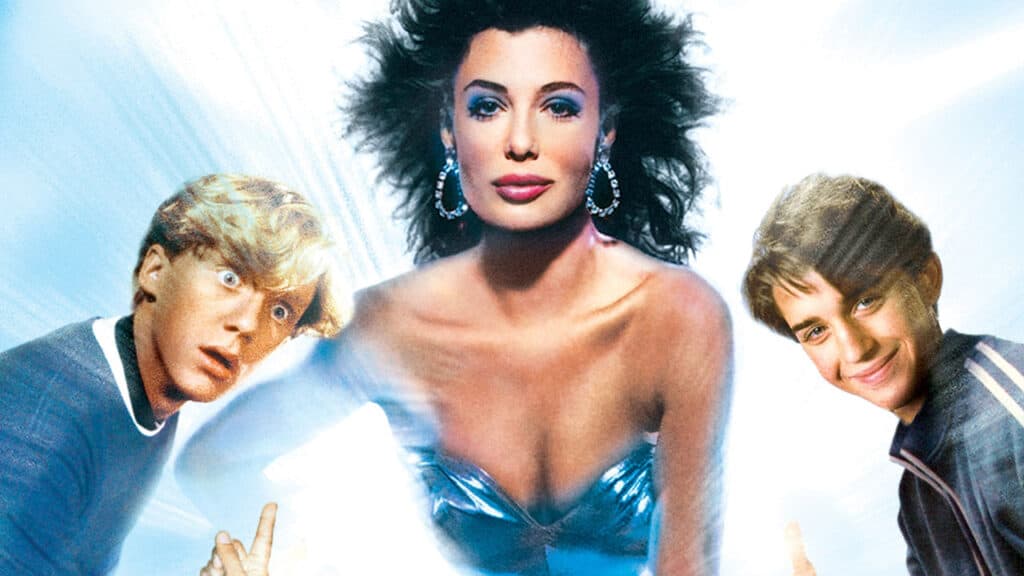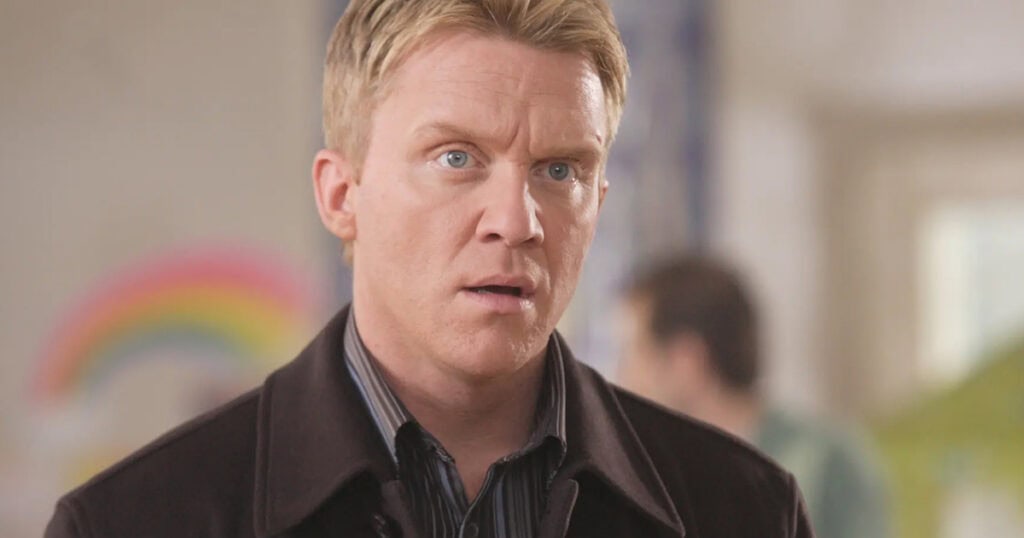
It’s 1985, and a lanky 17-year-old is nervously pacing backstage at NBC’s Studio 8H in New York City. In just a few minutes, he’ll make history as the youngest cast member ever to grace the stage of Saturday Night Live. This isn’t just any teenager – it’s Anthony Michael Hall, already a bonafide movie star thanks to his work with writer and director John Hughes, about to take on one of the most prestigious (and pressure-filled) gigs in comedy. As the familiar strains of the SNL theme song begin to play, Hall takes a deep breath, knowing that his life is about to change yet again. But did it change for the better? Did this skinny, awkward dork continue to bless us for decades with great cinema and comedy? Or did he take a darker, more difficult path of self-destruction and/or self-discovery? Did he spend the rest of his career trying to prove that he is more than just a skinny, awkward dork? Did his transformation into a buff bully work on screen, and did he become a buff bully off-screen as a result? Or is he just an awesome dude who makes cool movies and tv show? What Happened to Anthony Michael Hall?
Born Michael Anthony Thomas Charles Hall on April 14, 1968, in West Roxbury, Massachusetts, Hall’s journey to that SNL stage – and far beyond – is a Hollywood story for the ages. From his early days as the embodiment of teen awkwardness to his later career as a versatile character actor, Hall’s four-decade span in the entertainment industry is a testament to his enduring talent and adaptability.
Hall’s career kicked off at the tender age of 7 with his first commercial. But it was his role in the 1982 Kenny Rogers vehicle Six Pack that set the stage for his breakout. The following year, he appeared in National Lampoon’s Vacation, catching the eye of a filmmaker who would change his life: John Hughes.

In 1984, Hall starred as the quintessential geek Ted in Hughes’ Sixteen Candles. The New York Times wrote that he “made nerds seem lovable,” which, let’s be honest, is a bit of a backhanded compliment. But Hall’s portrayal was so spot-on, so endearing, that it catapulted him into the stratosphere of teen stardom.
1985 was the year that cemented Hall’s status as the king of teen nerds. He starred in two more Hughes classics: The Breakfast Club and Weird Science. In The Breakfast Club, Hall’s portrayal of Brian Johnson, the brainy, socially awkward “brain,” became an iconic representation of high school social dynamics. Weird Science took his nerd persona to new heights (or depths, depending on how you look at it) as Gary Wallace, a teen geek who creates the perfect woman using his computer.
These roles didn’t just make Hall famous; they made him a cultural touchstone. He became the face of every awkward, smart, misunderstood teenager in America. The impact of these films can’t be overstated – they’re still referenced, quoted, and rewatched decades later, with Hall’s performances at their heart.
At just 17, Hall became the youngest cast member in the history of Saturday Night Live. It’s worth noting that this was during what many consider one of the worst seasons in the show’s history. And that’s a high bar to clear. Or low bar? Who knows.
As the ’80s drew to a close, Hall was itching to break free from his nerd typecast. In a move that shocked many, he turned down two roles specifically written for him by John Hughes: Cameron Frye in Ferris Bueller’s Day Off and Phil “Duckie” Dale in Pretty in Pink. These decisions marked a turning point in Hall’s career and his relationship with Hughes.
Instead, Hall chose to star in the 1986 action thriller Out of Bounds, his first effort to play against type. This period marked a tumultuous time in the young actor’s life. In his own words, he “was drinking vodka by the quart every day” and “sometimes got in fights and punched people in the face.” It’s not hard to see this behavior as part overcompensation for being perceived as weak and part coping mechanism for the pressures of fame. He has been sober since 1990 but anger issues and what lawyers have describes as “unbalanced behavior” continued to haunt him. We will get to that in a bit.
His efforts to shed the nerd image continued with Johnny Be Good in 1988, where he played a highly recruited high school quarterback. The film, which also featured young Robert Downey Jr. and Uma Thurman, was an R-rated comedy that saw Hall’s character facing an impossible choice when pulled in opposite directions by his co-stars.
In 1990, Hall took on a role that surprised many in Tim Burton’s Edward Scissorhands. Playing the antagonist Jim, Hall showcased his ability to step away from his nerdy persona and into a more menacing role. This performance was a clear statement that he was more than capable of shedding his typecasting.
The ’90s saw Hall continue to diversify his roles. He appeared in the critically acclaimed Six Degrees of Separation in 1993, which also featured a young J.J. Abrams. In 1994, he even stepped behind the camera to direct Hail Caesar (not to be confused with the 2016 Coen Brothers film). 1995 brought A Bucket of Blood, a TV movie notable for being Will Ferrell’s film debut as “Young Man” and Jennifer Coolidge’s second turn, this time as “Stupid Girl” – roles they are both somehow still playing 30 years later.
A standout performance came in the TV movie Pirates of Silicon Valley in 1999, where Hall portrayed Microsoft founder Bill Gates opposite Noah Wyle’s Steve Jobs. This nuanced performance showcased Hall’s ability to inhabit complex characters beyond the teen roles that made him famous. It’s seriously one of the best made-for-television movies you’ll ever see from back when that was actually a thing. As Hall entered the new millennium, he continued to work steadily in both film and television. He appeared in Freddy Got Fingered in 2001 and also took on the role of legendary Yankees pitcher Whitey Ford (whose nickname was “the Chairman of the Board,” which sounds pretty badass) in Billy Crystal’s HBO film 61*. In 2002, Hall proved he was All About the Benjamins. Even 80s icons have to balance artistry with paying the bills.

He took on the lead role in the Stephen King-inspired series The Dead Zone from 2002 to 2007 (which we recently did on Gone But Not Forgotten), one of the earlier “gifted average citizen solves crimes better than trained veteran police officers” shows. This period also brought the challenge of a lawsuit from the show’s insurers over an undisclosed bipolar disorder.
He was also arrested in 2011 for disturbing the peace after allegedly threatening to beat up a neighbor. Not that this is an excuse for his behavior be he does seem to follow the pattern set by many other child stars before him. For sooooooome reason this industry can destroy a child and their innocence which leads to troubled adults who have to battle inner demons their whole lives. Sure, he has been sober for decades but did Anthony Michael Hall have what it takes to overcome the child star curse? Maybe making better movies would help and that’s exactly what he did!
Hall’s career trajectory took him from teen idol to character actor, with appearances in high-profile films like The Dark Knight in 2008 and critically acclaimed indies like Foxcatcher in 2014 and 2015’s Results – both minor roles in movies better-loved by critics than audiences. Looking at Hall in roles like 2013’s Dead in Tombstone and comparing him to his early appearances, you’d be forgiven for doing a double-take. I promise this is the same guy who once played the quintessential nerd, now transformed into a formidable screen presence.
But Anthony was still suffering inside, still struggling to control himself at times which lead to a 2016 assault charge after pushing down his neighbor during some sort of an argument which resulted in the neighbor breaking a wrist and Mr. Hall faced up to 7 years in prison for the attack but got 3 years probation. His most recent TMZ worthy controversy was yelling at some people at a pool in 2020 so yeah he does have a bit of a bad boy reputation but compared to many others in his biz, he’s not too bad, I guess.
In recent years, Hall has continued to take on diverse roles. He appeared in Live By Night in 2016, penned and helmed by Ben Affleck – pretty but vapid, like a lot of things and people in Hollywood. In 2021, he returned to the horror genre, playing Tommy Doyle in Halloween Kills, where he ably plays a role once held by Paul Rudd in his acting debut.
Today, Anthony Michael Hall continues to work steadily, balancing roles in big-budget productions with smaller, more experimental fare. His appearance in the 2024 Netflix film Trigger Warning shows he’s still in demand, even if the movie itself was more of an attempt to revive Jessica Alba’s action career. Director Mouly Surya did the feminist revenge story far better in 2017 with Marlina the Murderer in Four Acts.
Hall’s upcoming appearance in the film festival darling Roswell Delirium shows that he’s still willing to take risks and support independent cinema. Judging by the trailer, this film seems to outstrip its modest budget and, because it’s helmed by veteran cinematographer Richard Bakewell, looks absolutely gorgeous.
Anthony Michael Hall’s journey from the fresh-faced kid in John Hughes movies to the versatile actor we see today highlights his resilience, ability to evolve with the demands of his industry, and his enduring talent. He’s weathered the storms of early fame, battled personal demons, and emerged as a respected figure in an industry known for its fickleness. As he continues to take on new and challenging roles, one thing is certain: Anthony Michael Hall’s story is far from over, and audiences will be watching eagerly to see what he does next. In 1992, early in his journey of recovery from alcohol dependence, Hall told People Magazine, “I’m not just a good actor, I’m a great actor. I haven’t proven it yet, but I will.” Not everyone knew that then, but we certainly all do now.
The post What Happened to Anthony Michael Hall? appeared first on JoBlo.
Leave a Reply